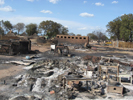
The Abyei Boundary Commission has "exceeded its mandate," according to a ruling from the Abyei Arbitration Tribunal handed down this morning in The Hague.
The tribunal’s ruling pertained to the question of whether or not the Abyei Boundary Commission, or ABC—established by the Abyei Protocol in Sudan’s Comprehensive Peace Agreement—“exceeded their mandate” in their 2005 report, which delineated the disputed boundaries of the oil-rich Abyei region and was intended to be a “final and binding decision.” The National Congress Party-led Sudanese government refused to accept the ABC report, which obstructed resolution of the standstill on Abyei. (You can read more about the Abyei arbitration process in the Annex of our strategy paper “Abyei: Sudan’s Latest Test.”)
The tribunal ruled that the ABC experts, "had exceeded their mandate in certain [not all] areas of its implementation" (this quote is from the Permanent Court of Arbitration’s press release on the ruling). Based on the sequence in the Arbitration Agreement signed by the Sudanese parties in July 2008, if the tribunal determined that the ABC experts had exceeded their mandate, then the tribunal would be required to "define (i.e. delimit) on map" the boundaries of Abyei in question. Therefore, the tribunal also issued a "dispositif," which defines Abyei’s new boundaries (see pages 7-9 of the Tribunal’s press release).
At the ceremony this morning in The Hague, both the Sudanese parties—the North’s National Congress Party-led Sudanese government and the South’s ruling Sudan Peoples Liberation Movement/Army—issued statements before the Presiding Arbitrator (essentially the head) of the Abyei Arbitration Tribunal read the tribunal’s ruling. In their statements, both sides agreed to implement the tribunal’s ruling and thanked the tribunal for its hard and thorough work during the arbitration process.
Following the announcement, AP reported the representative of the two Sudanese parties to the arbitration as saying:
We welcome the fact that the oilfields are now excluded from the Abyei area, particularly the Heglig oil field.
—Dirdeiry Mohamed Ahmed, head of the NCP-led Sudanese government’s delegation.
I think this is going to consolidate peace in Sudan. It is a victory for the Sudanese people and a victory for peace.
—Riek Machar, head of the Sudan People’s Liberation Movement.
How each side—the North’s National Congress Party and the South’s Sudan People’s Liberation Movement—responds to this ruling is a crucial litmus test of their will to implement the Comprehensive Peace Agreement. By extension, the aftermath of the ruling will also be a barometer for the efficacy of the Obama administration’s engagement on Sudan.
The ruling can and should further support the renewed commitment of the Sudanese parties and the international community to implement the faltering agreement that ended more than two decades of civil war in Sudan. It is also an opportunity to promote peace and development in one of the tensest regions in Sudan. However, the process of implementing the tribunal’s ruling and beginning work on an array of other provisions in the peace agreement (such as the plan for border demarcation and an agreement for North-South wealth-sharing following the South’s 2011 referendum), will not be easy. If the Comprehensive Peace Agreement is to hold, sustained, serious commitment from Sudanese parties and the international community will be essential in the remaining year and a half before the southern referendum.
There has been plenty of rhetoric on the commitment of all sides to implement this ruling. The people of Abyei—and throughout Sudan—are now waiting for the follow-through necessary to produce the “peace dividends” promised to them four and a half years ago.

